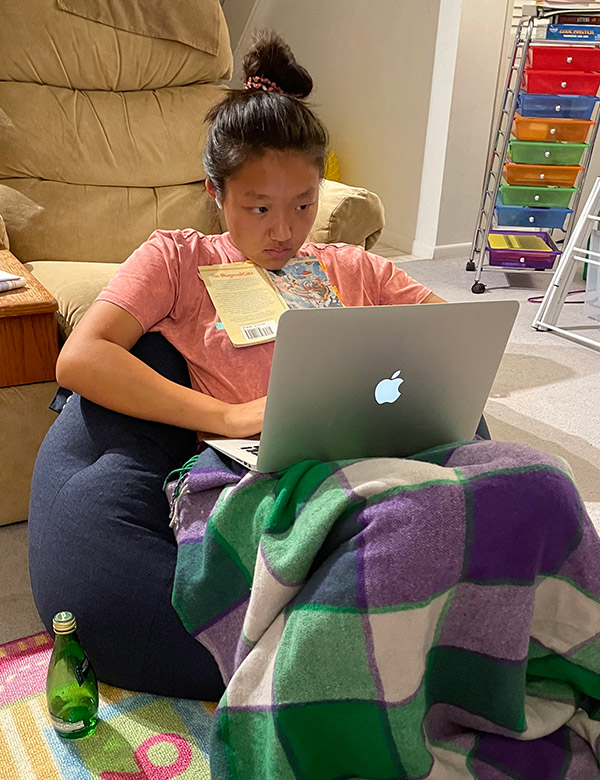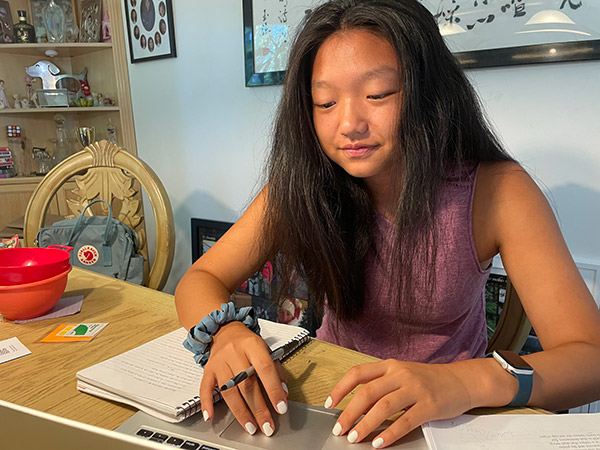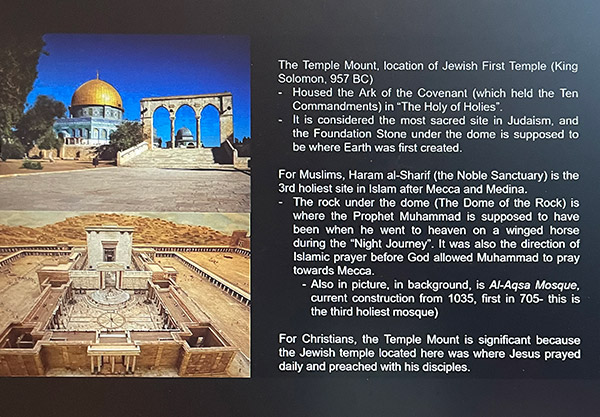Longmei Ge loved her first week attending the “Collegiate Writing: Awakening into Consciousness” course at the University of Chicago. According to Longmei, the class has been both challenging and interesting, with classmates encouraging each other to work hard.
“Because it’s a writing and philosophy class, we listen to lectures during the day on technical writing and close reading skills that come with related assignments. Within our class site on Canvas, we’re split into subgroups of 4 people. Typically after watching a lecture, an assignment will be given to write something of our own related to the video, then post it to our small group’s discussion board where we read our classmates’ posts and provide constructive criticism. This first week was spent understanding how to create specific nuanced claims, effectively connecting evidence and claims with reasoning, and how to close read,” Longmei explains.
Students are also required to read materials outside of class in preparation for daily classroom discussions.
“This week we’ve been examining the concept of awakening as it pertains to religion/spirituality, and so we read the Bhagavad-Gita, a Hindu epic. We finished it up on Thursday and read some Buddhist koans and writings by Pema Chödrön, an American-Buddhist nun, for Friday’s meeting,” Longmei says.
“We are encouraged by our instructor (Michael Subialka) to think of writing as a process as opposed to a product. This means we can’t put our writing off until the last minute. This also means a lot of revision. We wrote our papers throughout the week and submitted them on Thursday evening. Then, we met during the day on Friday to share our comments.,” Longmei reports.
Over the past week, the class discussed religious structures; mandalas and labyrinths; whirling dervishes; and a meditative scene from Five (a film by Abbas Kiarostami). Next week, students will be presenting their own work.
“On Monday, I’m presenting the poems, When I Heard the Learn’d Astronomer by Walt Whitman. I’m hoping to use it to open a discussion of the merits scientific ‘awakenings’ versus allowing things to retain their mystery, and whether a deeper, technical knowledge of something enhances or decreases beauty,” Longmei explains.
Longmei’s classmates have been organized into “houses” with students from other classes—to simulate dorm floor groups—while learning remotely via Zoom sessions.
“Our house, the Medici House, has almost 40 people in it, and the site we use is called Wisr. It allows you to message people in your house. It’s a little intimidating to reach out to people, but I’ve messaged 18. It’s so nice to meet people, even if it is virtually,” Longmei explains.
“There are so many unique people in my house. One has an online jewelry store, one does classical Indian dance and has a big performance coming up (she’ll be dancing solo for 3 straight hours), and another used to be a nationally ranked Tetris player,” Longmei adds.
“My course has been amazing, and the people I’m meeting are even more so,” Longmei says.
During her second week at the University of Chicago, Longmei’s class focused on The Four Quartets, poetry written by T.S. Eliot.
“We finished the Quartets last Thursday, and on Friday we watched (on our own) the movie Everything Is Illuminated, which has a lot of similar themes to Eliot’s poems (the role memory plays in our lives, and how it can transcend generations). It was a surprisingly funny movie, and the ‘main character,’ Jonathan, is played by Frodo Baggins,” Longmei says.
“Our asynchronous lectures this week have been on discourse structure, with a strong emphasis on guiding reader expectations and using keywords throughout a body paragraph and maintaining cohesiveness,” Longmei adds.
At the beginning of the course, students submitted presentation proposals, which were then presented throughout the final 2 weeks.
“For the remaining two weeks, two or three of us would give 10-15 minute presentations and mediate short discussions on our topic of choice (provided it was “green lit” by our instructor). I presented on Monday of week two, which was great. I like going first in presentations, because I always get really nervous and psych myself out when I have to go later. I presented Whitman’s poem “When I Heard The Learn’d Astronomer”, examining how mystery and knowledge affect beauty. Other students presented on tourism and travel, feminism, Beethoven’s 5th symphony (not the entire thing, of course, but sections of it), Plato’s Apologia Socratis, and an interactive door in the Cleveland Botanical Gardens,” Longmei reports.
Students were also assigned to seminar groups of 4 or 5 students where they were able to network, plus view and critique each other’s work, offering guidance as needed. “I think the seminars were probably the highlight of each week, partly because of the advice, but mainly because my seminar group mates were so cool,” Longmei says.
“I really adored my summer course at the University of Chicago. The pieces we read for the course were fascinating, and the discussion-based classes allowed me to get to know my classmates well, even though we were all at home. Along with participating in enriching discussions and fledging friendships, I learned so many new writing skills. I know “writing” is in the name of the course, but it was still a lot more writing that I anticipated, and I plan to fully utilize everything I’ve learned this summer to absolutely crush every literature analysis paper I have this year in English. I think beyond learning immediately applicable skills, I’ve learned a lot more about revision, and leaving time for revision, especially,” Longmei explains.
“I feel like I stepped away from the class with a host of new friendships and knowledge on collaboration and writing that can be applicable in all fields of study, and I really want to thank the Garwin Family Foundation for giving me the opportunity to take this summer course,” Longmei adds.
Wonderful, Longmei… We look forward to seeing your newly acquired writing skills in the future!
>> Read Longmei Ge’s Final Report (PDF file, 94 KB).
>> Learn about other students’ experiences in the GFF Scholarship Program.




